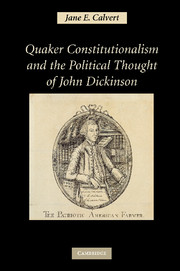Book contents
- Frontmatter
- Contents
- Acknowledgments
- Abbreviations
- Introduction
- I QUAKER CONSTITUTIONALISM IN THEORY AND PRACTICE, C. 1652–1763
- 1 Bureaucratic Libertines: The Origins of Quaker Constitutionalism and Civil Dissent
- 2 A Sacred Institution: The Quaker Theory of a Civil Constitution
- 3 “Dissenters in Our Own Country”: Constituting a Quaker Government in Pennsylvania
- 4 Civil Unity and “Seeds of Dissention” in the Golden Age of Quaker Theocracy
- 5 The Fruits of Quaker Dissent: Political Schism and the Rise of John Dickinson
- II THE POLITICAL QUAKERISM OF JOHN DICKINSON, 1763–1789
- Bibliography
- Index
- References
2 - A Sacred Institution: The Quaker Theory of a Civil Constitution
Published online by Cambridge University Press: 27 July 2009
- Frontmatter
- Contents
- Acknowledgments
- Abbreviations
- Introduction
- I QUAKER CONSTITUTIONALISM IN THEORY AND PRACTICE, C. 1652–1763
- 1 Bureaucratic Libertines: The Origins of Quaker Constitutionalism and Civil Dissent
- 2 A Sacred Institution: The Quaker Theory of a Civil Constitution
- 3 “Dissenters in Our Own Country”: Constituting a Quaker Government in Pennsylvania
- 4 Civil Unity and “Seeds of Dissention” in the Golden Age of Quaker Theocracy
- 5 The Fruits of Quaker Dissent: Political Schism and the Rise of John Dickinson
- II THE POLITICAL QUAKERISM OF JOHN DICKINSON, 1763–1789
- Bibliography
- Index
- References
Summary
The late-seventeenth century was an intensely creative period in Quaker political thought. Between 1669 and 1701, members of the Society wrote and implemented at least seven constitutions both ecclesiastical and civil. Yet the idea of Quaker constitutionalism is oxymoronic to many political historians, who have considered Quakers to be quietistic “withdrawers” from civic life; this is despite the fact there is a substantial body of literature that attests to their political activities. But while scholars have undertaken important examinations of the political philosophy of William Penn and studies of practical politics in Pennsylvania, few have attempted to explore the thought of Quakers as a body in detail and with consideration of their theology. Moreover, those who address the topic of their theory disagree on how to classify it. Some situate them in the Whig tradition; others count them as Tories during the American Revolution; and others simply deny that specific principles of theirs are whiggish, but do not offer much beyond that. But to categorize them within any single early modern tradition or language causes us to imagine affinities where none exist and to ignore important variations. As Quakers themselves said, “neither are we for one party or another.” An exegesis of their theory on its own terms is long overdue. Their ideas overlapped in some significant ways with other thought of the seventeenth and eighteenth centuries, but they came to them often through unique routes and for peculiarly Quaker ends.
- Type
- Chapter
- Information
- Publisher: Cambridge University PressPrint publication year: 2008



